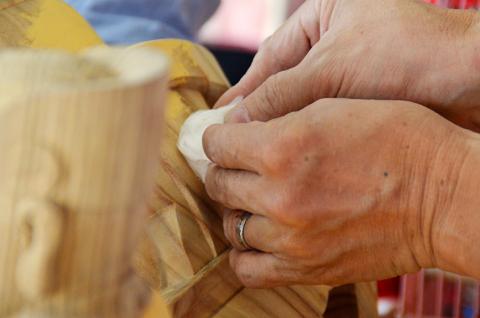Following a public outcry and condemnations by activists this week, officials at a temple in Greater Tainan yesterday made a public apology for the temple’s ritual of stuffing live birds into sealed statues of deities.
The ritual took place at Kaisianjhen Temple (開仙真宮) in Greater Tainan’s Sigang District (西港), in effect making the birds sacrificial offerings, for the consecration and empowerment of statues of deity the Baosheng Emperor (保生大帝), the god of medicine.
Cheng Teng-feng (鄭登峰), head of Kaisianjhen Temple’s management committee, said that following the public outcry, the committee convened a meeting on Tuesday night and decided to make a public apology.

Photo courtesy of Kaisianjhen Temple, Greater Tainan
The practice came to light after someone posted a video online showing the ceremony.
In the video a temple official grabs a white Java sparrow from a bird cage and stuffs it into a round hole in the back of a wooden statue of the Baosheng Emperor. The opening is then sealed up and the bird left inside to die.
“This ritual has been practiced for several centuries. It came from a divine mandate by the gods. It is not a deliberate act to abuse animals,” Cheng said. “We will respect the adjudication by the Greater Tainan Animal Health Inspection and Protection Office.”
In the future we shall seek the guidance of deities and will respect the views of the public. Times have changed and we shall endeavor to make appropriate adjustments,” he said.
Greater Tainan Animal Health Inspection and Protection Office deputy director Wu Ming-pin (吳名彬) said the office would collaborate with other agencies and talk to all local temples to end the practice of stuffing live animals inside statues, leaving the creatures to die by suffocation or starvation.
Wu added that his office is now investigating whether the temple’s action violated Article 6 of the Animal Protection Act (動物保護法), which prohibits the maltreatment and abuse of animals.
When the video was posted on the Web, many netizens were in uproar, with some calling it a cruel, inhumane practice that should be stopped and calling for the lives of the unfortunate birds to be saved.
Wild Bird Society of Tainan secretary-general Kuo Tung-hui (郭東輝) said stuffing birds inside statues of deities by temples, for “illlumination” and to imbue “magical power,” is nothing but superstition.
Hsieh Chu-yi (謝主義), a master carver of statues of deities in Greater Tainan, said stuffing animals inside as “treasures” to imbue divine power had long been practiced at some temples as part of traditional worship.
Hsieh said when the statues of deities are encased in gold foil, certain deities will instruct a spirit-possessed medium (乩童) to place “treasures” inside them. Most of the time, the “treasures” are hornets, but other creatures, such as snakes and centipedes, are also used as they represent the animal embodiment of certain deities.
“As well as the Java sparrow, some temples use the yellow warbler and the crested minah bird for this purpose,” Hsieh said.

TRAGEDY STRIKES TAIPEI: The suspect died after falling off a building after he threw smoke grenades into Taipei Main Station and went on a killing spree in Zhongshan A 27-year-old suspect allegedly threw smoke grenades in Taipei Main Station and then proceeded to Zhongshan MRT Station in a random killing spree that resulted in the death of the suspect and two other civilians, and seven injured, including one in critical condition, as of press time last night. The suspect, identified as a man surnamed Chang Wen (張文), allegedly began the attack at Taipei Main Station, the Taipei Fire Department said, adding that it received a report at 5:24pm that smoke grenades had been thrown in the station. One man in his 50s was rushed to hospital after a cardiac arrest

A car bomb killed a senior Russian general in southern Moscow yesterday morning, the latest high-profile army figure to be blown up in a blast that came just hours after Russian and Ukrainian delegates held separate talks in Miami on a plan to end the war. Kyiv has not commented on the incident, but Russian investigators said they were probing whether the blast was “linked” to “Ukrainian special forces.” The attack was similar to other assassinations of generals and pro-war figures that have either been claimed, or are widely believed to have been orchestrated, by Ukraine. Russian Lieutenant General Fanil Sarvarov, 56, head

SAFETY FIRST: Double the number of police were deployed at the Taipei Marathon, while other cities released plans to bolster public event safety Authorities across Taiwan have stepped up security measures ahead of Christmas and New Year events, following a knife and smoke bomb attack in Taipei on Friday that left four people dead and 11 injured. In a bid to prevent potential copycat incidents, police deployments have been expanded for large gatherings, transport hubs, and other crowded public spaces, according to official statements from police and city authorities. Taipei Mayor Chiang Wan-an (蔣萬安) said the city has “comprehensively raised security readiness” in crowded areas, increased police deployments with armed officers, and intensified patrols during weekends and nighttime hours. For large-scale events, security checkpoints and explosives

PUBLIC SAFETY: The premier said that security would be tightened in transport hubs, while President Lai commended the public for their bravery The government is to deploy more police, including rapid response units, in crowded public areas to ensure a swift response to any threats, President William Lai (賴清德) said yesterday after a knife attack killed three people and injured 11 in Taipei the previous day. Lai made the remarks following a briefing by the National Police Agency on the progress of the investigation, saying that the attack underscored the importance of cooperation in public security between the central and local governments. The attack unfolded in the early evening on Friday around Taipei Main Station’s M7 exit and later near the Taipei MRT’s Zhongshan